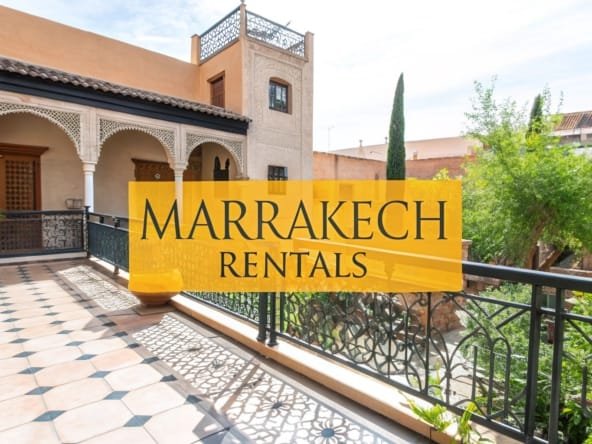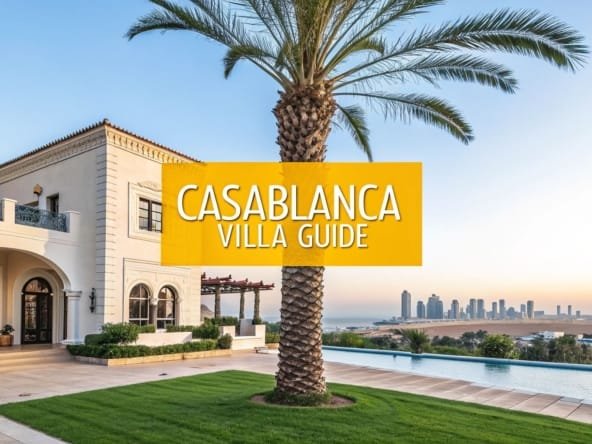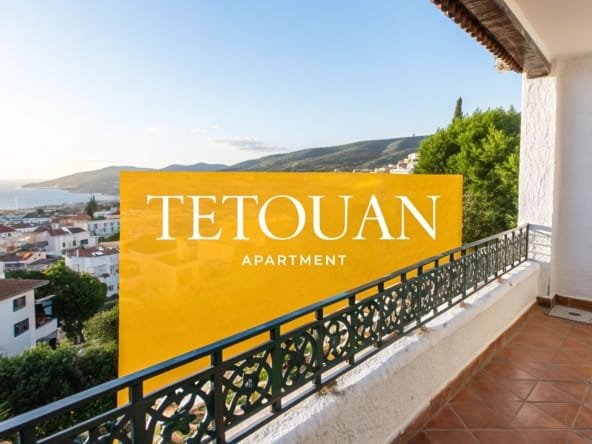Finding the right apartment for sale in Tangier—or شقق للبيع في طنجة as you'll see it locally—begins with getting to know its uniquely dynamic property landscape. The city's strategic perch as a gateway between Europe and Africa, supercharged by massive infrastructure projects, has made it a hotspot for savvy investors and anyone dreaming of a home on the Mediterranean.
Navigating the Tangier Property Market
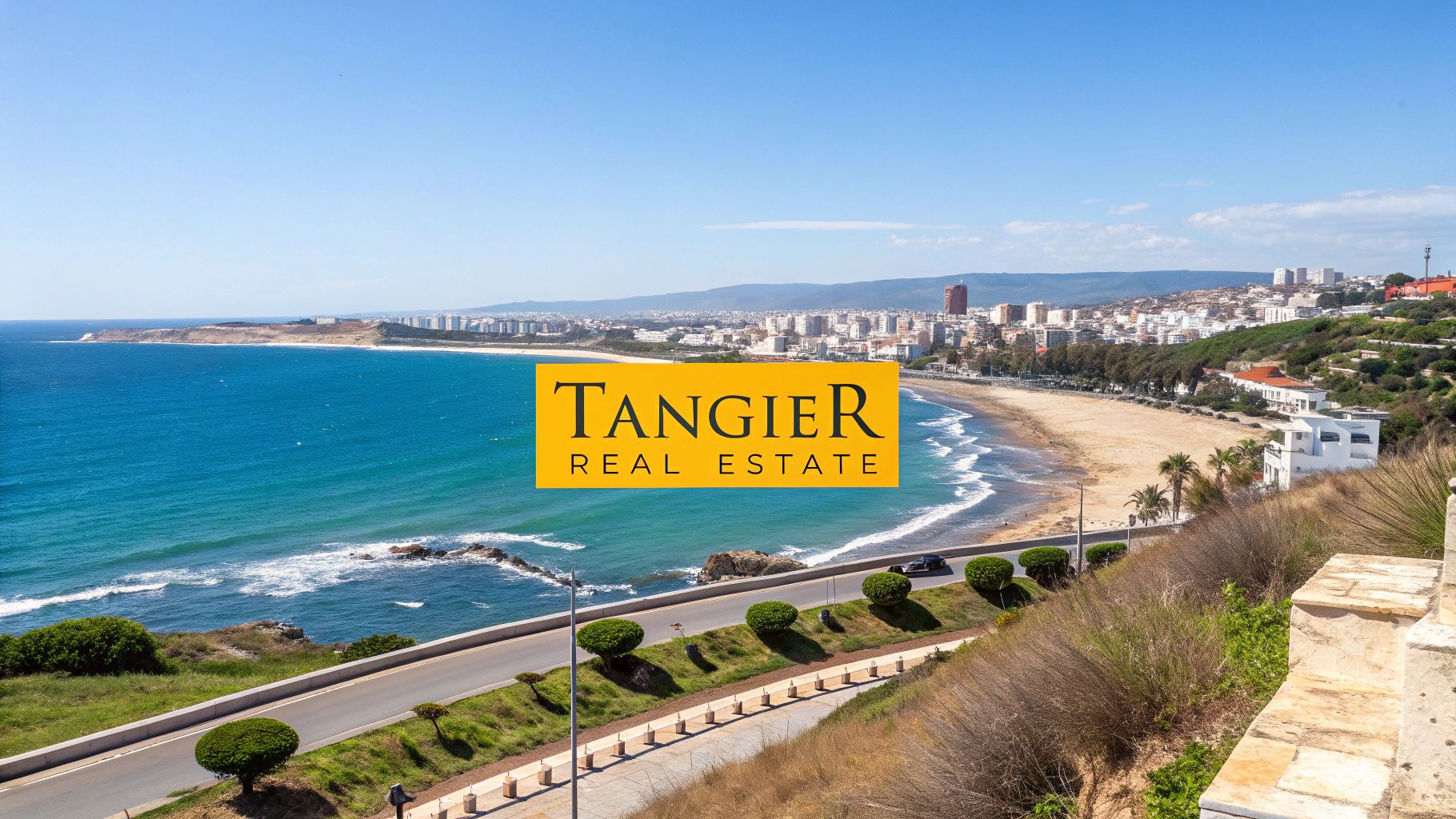
Before you even think about scrolling through listings, it’s crucial to understand what makes Tangier’s real estate market tick. This isn't just another pretty coastal city; it's a major economic engine for Morocco.
This growth is fuelled by game-changing projects like the Tangier Med Port—one of Africa's largest—and the Al Boraq high-speed train that zips you to Casablanca. These developments have put Tangier on the map as an international hub, drawing in businesses, tourists, and a steady stream of new residents looking for a place to call home.
Naturally, this economic boom has a direct impact on the property market. Demand for quality housing is climbing, creating a vibrant and competitive environment. You'll find a huge range of properties, from sleek, modern apartments in new developments to charming, character-rich flats in more established parts of the city.
Why Tangier Captures Buyer Interest
So, what’s the big draw? Several key factors make Tangier a compelling choice. Its strategic location is a massive advantage, offering seamless connectivity. But beyond logistics, the city offers an incredible quality of life, blending traditional Moroccan culture with European flair, beautiful beaches, and a food scene that's second to none.
This appeal is clearly reflected in property values. Tangier has become a serious real estate destination, attracting international buyers and Moroccans living abroad. In mid-2025, the average price per square metre in Tangier's luxury segment hit around 34,000 MAD (roughly 3,400 USD), putting it on par with other major cities. This growth is also getting a boost from investors in the Gulf region, who are increasingly drawn to premium properties along the Mediterranean coast. You can dig deeper into Tangier's real estate hotspots for buyers to understand the investment climate better.
Identifying the Right Neighbourhoods
Picking the right neighbourhood is just as critical as picking the right apartment. Every area in Tangier has its own distinct personality, so your choice really comes down to your lifestyle and priorities.
To help you get started, here’s a quick look at some of the most sought-after areas.
A Snapshot of Popular Tangier Neighborhoods
| Neighborhood | Key Features | Ideal For | Average Price Range (per m²) |
|---|---|---|---|
| City Centre (Centre-Ville) | Bustling urban atmosphere, close to shops, cafes, and historic sites. Classic, well-maintained buildings. | Those who love being in the heart of the action and appreciate historic charm. | 12,000 – 18,000 MAD |
| Malabata & Bay Area | Stunning sea views, modern high-rises, beachfront access, resort-style amenities. | Buyers seeking contemporary living, luxury finishes, and proximity to the water. | 18,000 – 25,000+ MAD |
| California & Iberia | Quiet, leafy residential suburbs with larger apartments and green spaces. | Families and individuals looking for a peaceful retreat from the city buzz. | 15,000 – 22,000 MAD |
This table gives you a starting point, but there’s no substitute for experiencing these places firsthand.
My best advice for buyers is to spend real time in a few different neighbourhoods before making any decisions. Visit in the morning, afternoon, and evening to get a genuine feel for the atmosphere, traffic, and overall community vibe. That personal insight is priceless.
Understanding Apartment Types and Investment Potential
The sheer variety of apartments for sale in Tangier means there’s something for nearly every budget and lifestyle. You’ll find everything from compact studios—perfect for a single person or as a rental investment—to sprawling three or four-bedroom apartments designed for families. Many newer buildings also offer fantastic perks like swimming pools, gyms, and secure underground parking.
Don’t forget the investment angle. The city's booming tourism industry creates a huge opportunity for rental income, especially short-term holiday lets. An apartment in a prime spot like the city centre or near the beach can generate excellent returns, turning your property into a hard-working asset. A strategic purchase isn't just about finding a home; it's a smart financial move.
Budgeting and Financing Your Apartment Purchase
Finding your perfect apartment in Tangier is exciting, but the journey truly begins with a solid financial game plan. It’s easy to get caught up in property listings, but looking beyond the sticker price is absolutely critical. The final cost of buying a home here involves several other significant expenses that can easily catch you by surprise if you're not prepared.
Think of a comprehensive budget as your roadmap. It turns a dream into a defined, achievable goal, giving you the clarity and confidence to move forward. This planning ensures you're looking at properties within your means, saving you from future disappointment and financial strain.
Deconstructing the Total Purchase Cost
The advertised price of an apartment is just the starting point. To avoid any last-minute financial shocks, you need to account for a range of closing costs. From my experience, these typically add an extra 7% to 10% on top of the property’s price.
Here’s a rundown of the key expenses you’ll need to factor in:
- Notary Fees (Frais de Notaire): These are mandatory fees that cover the notary’s work in drafting and registering all the legal documents. You can't close a deal in Morocco without one.
- Registration Tax (Droits d'Enregistrement): This is a government tax calculated on the property's value. The rate can vary, but it’s a substantial cost to budget for.
- Land Registry Fees (Conservation Foncière): This fee is for officially updating the property title with your name, securing your legal ownership.
- Agency Commission: If you work with a real estate agent, their commission is usually paid by the seller. However, it's always smart to confirm this in your agreement to prevent any misunderstandings.
Getting a handle on these extra costs is essential for an accurate budget. For a really detailed breakdown, you can learn more about the specifics of notary fees in Morocco, which explains exactly how these costs are structured.
This infographic gives you a quick visual summary of how to plan your budget for an apartment in Tangier.
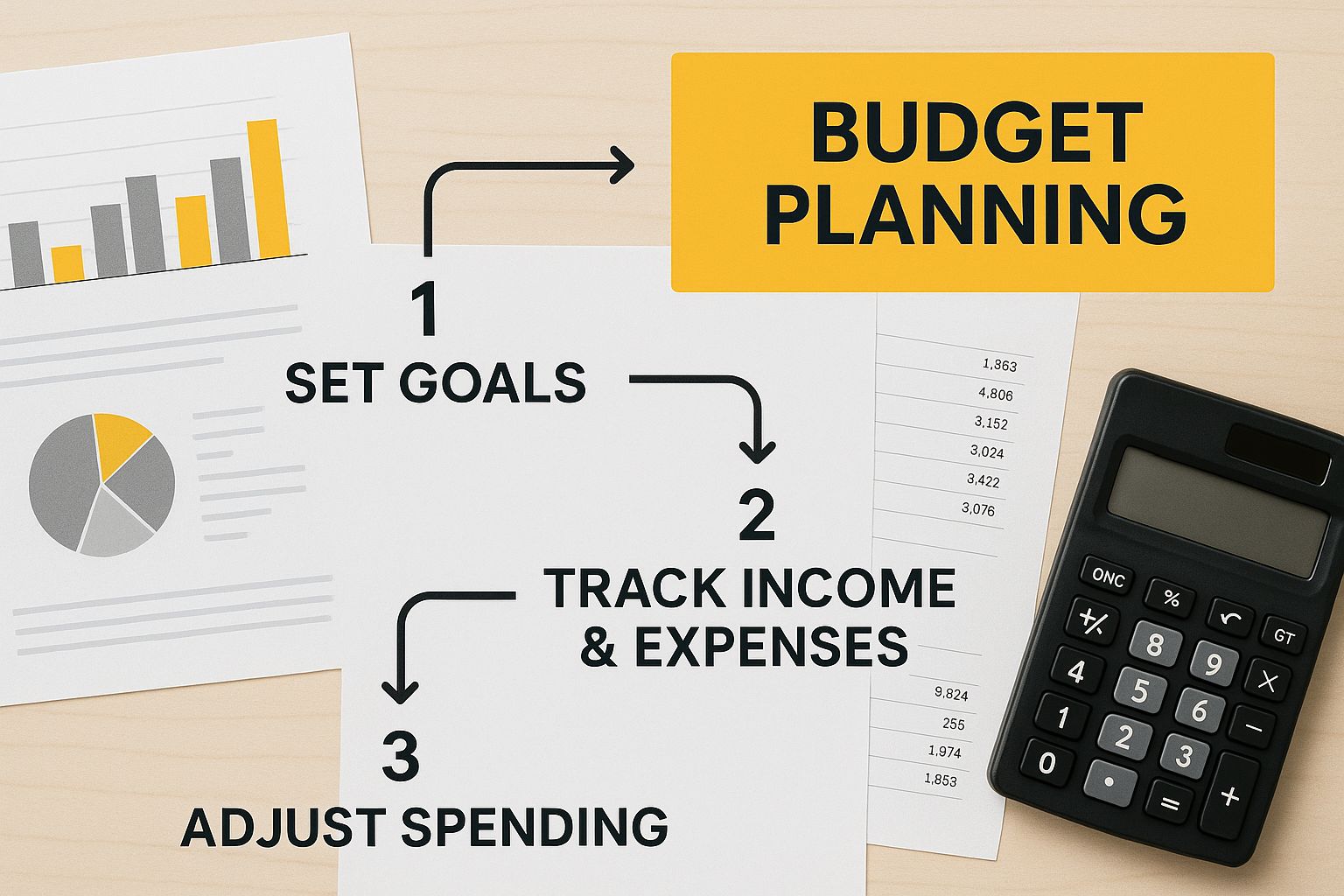
As you can see, a successful purchase starts with a clear picture of all the costs involved, not just the sale price.
Exploring Your Financing Options
Once you have a clear idea of the total cost, it's time to figure out how you'll pay for it. The good news is that both Moroccan residents and foreign buyers can access financing through local banks.
Moroccan banks are quite open to lending to non-residents, though the conditions might be slightly different. They’ll want to see proof of your financial stability—your income, employment history, and any existing debts—to assess your application.
"A piece of advice I always give my clients: get mortgage pre-approval before you start seriously viewing properties. It shows sellers and agents you're a serious, qualified buyer, which can give you a real advantage when it's time to negotiate."
The Mortgage Application Journey
Applying for a mortgage in Morocco follows a clear process. The key is to get all your documents in order ahead of time to make everything run smoothly.
You'll almost certainly need to provide:
- Proof of Identity: A passport for foreigners or a CINE for Moroccan residents.
- Proof of Income: This usually means recent payslips, an employment contract, or tax returns.
- Bank Statements: Most banks ask for the last three to six months to see a stable financial history.
- Preliminary Sales Agreement (Compromis de Vente): The bank needs this agreement to formally process the loan against a specific property.
Typically, the loan-to-value (LTV) ratio offered by Moroccan banks goes up to 80% of the property’s value for residents, and often a little lower for non-residents. This means you’ll need a down payment for the remaining 20%, plus all those closing costs we talked about.
Let's run a quick example. For a 1,500,000 MAD apartment, a 20% down payment is 300,000 MAD. If you add another 8% for closing costs (120,000 MAD), you'd need about 420,000 MAD in cash to seal the deal.
Interest rates can be either fixed or variable. It's really important to sit down with a banking advisor and discuss both options to figure out which one aligns best with your financial goals. With a clear budget and financing pre-approval in hand, you'll be in a powerful position to find and secure your perfect apartment in Tangier.
Navigating the Legal Side of Buying Property
Buying an apartment in Tangier isn't just about finding the right place and securing the funds; it's about navigating Morocco's legal framework with confidence. For anyone new to the process, especially international buyers, this can feel like the most daunting part. But it's actually a well-defined path designed to protect everyone involved. With the right people on your side, you'll get through it smoothly.
Your Legal Team: Notary and Lawyer
The central figure in any Moroccan property transaction is the notary (notaire). Appointed by the King, a notary is a public officer who acts as a neutral third party. Their job is to ensure the entire sale is legal, from drafting the official documents and verifying ownership to securely managing the flow of money. Their involvement is not optional—it's mandatory.
While the notary ensures legality, many buyers also bring in their own lawyer for an added layer of protection. A lawyer works just for you. They'll scrutinize every detail, offer advice during negotiations, and help you tackle any tricky issues that pop up. Think of them as your personal advocate, giving you that extra bit of assurance.
The Two Key Contracts on Your Journey
The road from making an offer to getting the keys is marked by two critical legal documents. Understanding what they are and what they do is essential.
First, you'll sign the preliminary sales agreement, or the 'compromis de vente'. This is a big moment. It’s a legally binding contract that locks in the deal and gets the ball rolling.
Inside this agreement, you’ll find:
- The final, agreed-upon price.
- A detailed description of the apartment.
- The timeline for completing the sale.
- Any 'escape clauses' (
clauses suspensives), like the sale being conditional on you securing a mortgage.
When you sign the 'compromis de vente', you'll also pay a deposit, which is typically 10% of the purchase price. Don't worry—this money doesn't go to the seller directly. It’s held safely in the notary's escrow account until the final papers are signed.
The grand finale is signing the definitive deed of sale, the 'acte de vente'. This is the document that officially makes the property yours. Once you, the seller, and the notary have all signed, it's registered with the land registry. Congratulations, you are now the legal owner.
Why Meticulous Due Diligence is Non-Negotiable
Before you even think about signing anything, a thorough investigation—or due diligence—is an absolute must. This is where you and your legal team dig into the property's history to make sure there are no hidden surprises waiting for you. Skipping this step is a recipe for future legal and financial headaches.
The most important document to check is the property’s title deed, the 'titre foncier'. This is the bedrock of property ownership in Morocco.
A clean 'titre foncier' confirms three crucial things:
- Clear Ownership: It proves the seller is the one and only legal owner.
- No Hidden Debts: It shows if there are any mortgages, liens, or legal claims (
hypothèques) attached to the property. - Correct Details: It verifies the exact size and legal boundaries of the property.
Your notary will get an updated certificate from the land registry (Conservation Foncière) to confirm everything is in order. If you want to dive deeper into this cornerstone of Moroccan property law, our detailed guide on the titre foncier explains everything you need to know.
I cannot stress this enough: never proceed with a purchase, especially a deposit payment, until the 'titre foncier' has been thoroughly verified by your notary. A clear title is the foundation of a secure and risk-free property investment.
Due diligence doesn't stop there. It also means checking that the previous owner has paid all their property taxes and that any co-ownership (syndic) fees are up to date. A full legal check-up like this clears the way for a transparent, worry-free purchase, letting you focus on what really matters—the excitement of your new home in Tangier.
Finding and Negotiating Your Ideal Apartment

Alright, with your finances sorted, we get to the fun part: the hunt for your perfect Tangier apartment. This is where the pavement-pounding and digital-digging begin. Finding the right place—and getting it at the right price—is a delicate dance of smart searching, sharp observation, and savvy negotiation.
The very first question you need to answer is how you'll search. Are you going to team up with a real estate agent or go it alone? Both have their merits, and the right choice depends entirely on you.
Choosing Your Search Strategy
For anyone new to Tangier's property market, especially international buyers, a good local real estate agent is worth their weight in gold. They live and breathe this market. They know the neighbourhoods, have access to listings before they even hit the public sites, and can save you from wasting countless hours on unsuitable viewings. More importantly, they act as your guide and advocate through the entire process.
On the other hand, if you're the type who loves the thrill of the chase and feels confident navigating the market, you can certainly fly solo. Property portals are packed with listings, giving you the freedom to browse at your leisure. This approach puts you in the driver's seat, handling everything from initial contact to negotiation directly with the seller.
A hybrid approach is often the smartest play. Start by exploring online to get a solid feel for different areas and price points. Once you’ve narrowed down your focus, bring in an agent to arrange viewings and lend their professional expertise when it's time to make a move.
Mastering the Property Viewing
Walking into a potential new home is exciting, but it’s crucial to look past the fresh paint and the stunning sea view. A viewing is your chance to play detective. You're not just looking for a place to live; you're inspecting an investment.
Go into every viewing with a critical eye and a mental checklist. Emotions can run high, but this is a business decision.
Here are a few non-negotiables to focus on:
- Structural Health: Scan walls and ceilings for any tell-tale water stains or patches of damp. A musty smell is a major red flag. Look for any significant cracks that could point to deeper structural issues.
- Essential Systems: Don't be shy—turn on the taps. Test the water pressure in the kitchen and bathrooms. Check the age and apparent condition of the water heater and any air conditioning units. Ask about the state of the plumbing and electrical systems.
- Building Life: Get the details on the co-ownership association, known as the
syndic. What are the monthly fees? What do they cover? Crucially, are there any major repairs or special financial assessments planned for the near future? - The Vibe: Try to visit at different times of the day. The quiet, peaceful apartment you saw on a Tuesday morning might have a very different feel on a Friday evening. Listen for noise from neighbours and the street below.
This is your opportunity to get answers. A motivated and honest seller will be ready to discuss the property's condition openly.
The Art of Negotiation in Tangier
You’ve found it. The apartment that ticks all the boxes. Now comes the negotiation. In Morocco, making an offer is an expected part of the process, but it's one that requires respect and a firm grasp of the property's real value.
Your best ammunition is knowledge. Before you even think about a number, dive into the data. What have similar apartments in that building or neighbourhood sold for recently? This information is your foundation for making a fair, confident, and defensible offer.
The market in Tangier right now is interesting. While certain desirable districts saw prices climb 5% to 8% in 2024, with another 6% to 10% increase forecasted for 2025, the city-wide picture is more moderate. Across the board, prices only rose by 0.34% and actually dropped 1.24% in real terms after inflation. You can dig deeper into these numbers with Tangier's 2025 property market forecasts.
What does this mean for you? It means that while the market has hot spots, there's absolutely room to negotiate. Your initial offer should reflect this reality—grounded in data, confident but not aggressive. Expect a counteroffer; this is a conversation, not a demand. The ultimate goal is to land on a price that feels fair to both you and the seller, setting the stage for a smooth and successful purchase.
Making Your Tangier Property Work for You
Getting the keys to your new apartment is a fantastic moment, but it’s not the end of the journey. In a city like Tangier, that property is more than just a home—it's a financial asset with serious potential. Figuring out how to make it generate a return is the final piece of the puzzle for a truly smart purchase.
So, what's the plan? Will this be your full-time home, a source of steady rental income, or a holiday escape that practically pays for itself? Each path offers different rewards, and the best strategy is the one that lines up perfectly with your long-term financial goals.
Understanding the Tangier Rental Scene
Thanks to its booming economy and status as a tourist hotspot, Tangier has a really strong rental market. This gives you, the property owner, two main avenues to explore, each with its own rhythm and potential payoff. The choice usually boils down to a simple question: Do you prefer predictable, hands-off income, or are you willing to be more involved for a higher potential return?
Let's break down the two core strategies.
-
Long-Term Leases: This is the classic rental model. You find a tenant, they sign a lease for a year or more, and you collect a steady rent check each month. It's generally lower maintenance and offers great stability, making it perfect for investors who want a reliable, hands-off income stream.
-
Short-Term Holiday Rentals: Think Airbnb or Booking.com. You’re renting your place out to tourists and visitors for days or weeks at a time. It's definitely more work—think check-ins, cleaning, and constant guest communication—but the earning potential can be significantly higher, especially during Tangier’s peak tourist seasons.
My advice to new investors is always this: be realistic about how much time you can actually commit. Short-term rentals can be incredibly profitable, but you're essentially running a small hospitality business. If that's not for you, a long-term lease provides peace of mind and a consistent return you can bank on.
The Power of Short-Term Holiday Lets
The holiday rental scene in Tangier is absolutely buzzing, fuelled by a constant stream of international visitors. The numbers from 2025 really tell the story.
Between September 2024 and August 2025, Airbnb listings in Tangier had an average occupancy rate of 49%. The average daily rate (ADR) hovered around 769 MAD (about $76 USD), which translated to an average annual revenue of 131,000 MAD ($13,000 USD) for each listing. With over 3,200 active listings, it's a competitive market, but a very rewarding one. You can dig deeper into Tangier's impressive Airbnb market performance to see the full picture.
This data makes it clear: a well-managed, well-located apartment can bring in serious income, often much more than a standard long-term rental.
Comparing Long-Term and Short-Term Rental Strategies
Choosing the right path depends entirely on your financial goals and how hands-on you want to be. This table breaks down the key differences to help you decide which approach is the best fit for your new Tangier property.
| Factor | Long-Term Rentals | Short-Term (Holiday) Rentals |
|---|---|---|
| Income Stream | Stable, predictable monthly payments. | Variable, with high peaks in tourist season. |
| Potential Yield | Generally lower but more consistent. | Significantly higher, but less predictable. |
| Management | Minimal day-to-day effort after tenant is placed. | Requires active management (bookings, cleaning, etc.). |
| Wear & Tear | Consistent use by one tenant. | Higher due to frequent guest turnover. |
| Flexibility | Low; property is occupied for a year or more. | High; you can block off dates for personal use. |
| Regulations | Governed by standard landlord-tenant laws. | Subject to specific tourism and short-let regulations. |
Ultimately, both strategies can be highly effective. A long-term lease offers a "set it and forget it" approach, while short-term rentals offer the potential for greater financial rewards if you're prepared for the operational demands.
Building Your Investment Strategy
Whether you go for long-term stability or chase those short-term gains, you need a solid plan. Think about your financial targets, how you'll manage the property, and your marketing approach.
If the high yields of holiday lets are calling to you, seriously consider hiring a local property management company. They can handle everything from bookings and guest communication to cleaning and maintenance, all for a percentage of your rental income. It's a great way to cash in without the daily hassle.
For long-term rentals, your entire focus should be on finding a great tenant. A reliable tenant is the bedrock of a stress-free investment. Don't skip the screening process, and make sure you have a rock-solid lease agreement in place to protect your asset.
At the end of the day, maximizing the return on your search for شقق للبيع في طنجة means treating your purchase like a business. By understanding the market and choosing a strategy that fits your lifestyle, your Tangier apartment can become a powerful cornerstone of your financial future.
Tying Up Loose Ends: Common Questions About Buying in Tangier
Once you've navigated the major steps, a few practical questions almost always pop up. Getting these details sorted is the final piece of the puzzle, giving you the confidence to sign on the dotted line. Let's tackle some of the most common queries I hear from prospective buyers.
Are Foreigners Actually Allowed to Buy Property?
This is the number one question, and the answer is a resounding yes. Morocco's property laws are refreshingly straightforward and open to international buyers.
As a foreigner, you have the exact same rights as a Moroccan citizen when purchasing a titled property (what's known as a 'titre foncier'). This means you can buy, own, and later sell your apartment without jumping through any extra hoops or facing special restrictions. The entire process, from the initial sales agreement ('compromis de vente') to the final deed ('acte de vente'), is identical, providing a secure and clear legal framework for your investment.
What Are the Hidden Costs of Ownership?
Your budget doesn't end with the purchase price. To be a successful owner, you need to plan for the regular costs that come with maintaining a property in Tangier.
Think of it in three main parts:
- Property Tax (Taxe d'Habitation): This is an annual tax paid to the government, calculated based on the property's estimated rental value.
- Municipal Services Tax (Taxe de Services Communaux): A smaller annual tax that covers local services like rubbish collection and street maintenance.
- Co-ownership Fees (Syndic): If you're in an apartment building, you'll contribute monthly or quarterly to the building's management. This covers the upkeep of common areas like the lift, lobby, gardens, or a shared pool.
These aren't just minor details; they are part of your long-term financial commitment.
Here's a pro tip I always give my clients: Before you finalise anything, ask the seller for a history of the property taxes and a full breakdown of the 'syndic' fees from the past two years. This gives you a crystal-clear picture of what you'll actually be paying.
Is There a "Best" Season to Buy?
While a great apartment can pop up at any time, the Tangier market definitely has its own rhythm. If you're looking for a potential edge, the sweet spot is often just after the high season buzz dies down, from September through November.
In these autumn months, the market is less frenzied. Sellers who were hoping for a quick summer sale might be more open to negotiation, creating a window of opportunity for savvy buyers looking for شقق للبيع في طنجة (apartments for sale in Tangier).
The spring, from March to May, is also a very active period. You'll see more listings as sellers get ready for summer, but you'll also likely face more competition from other buyers. At the end of the day, the perfect time is when you've found the right place and your financing is ready to go.
At Rich Lion Properties, we provide the clarity and expertise you need to navigate every step of your property journey in Morocco. Explore our listings and expert services today.

